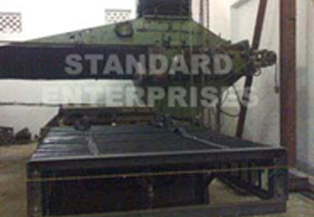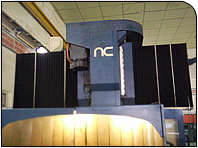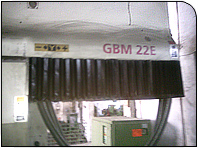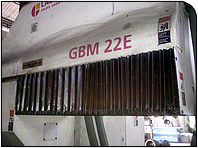Non Metallic Bellows Cover
Non-metallic bellows covers are protective devices that shield machinery parts, particularly moving or rotating components, from external contaminants such as dirt, dust, water, oils, and chemicals, while also preventing the leakage of lubricants from the machinery itself. These bellows covers are typically used in industries that require precise operations, such as the machine tool, semiconductor, medical, and food processing sectors.
We are instrumental in manufacturing metallic & non-metallic bellows that are used as covers for screws, rods and ball bushings. These bellows are available in various customized sizes, to meet the specific requirements of our clients. Further, these bellows are properly tested before dispatching, to ensure their efficient performance and high durability.
Features of Non-Metallic Bellows Covers
- Flexibility : Non-metallic materials like fabric, elastomers, or rubber can flex and move without hindrance. This makes them suitable for applications that involve motion, such as machine tool slides or robotic arms.
- Lightweight : Non-metallic bellows are generally lighter than their metallic counterparts, which can be advantageous for dynamic applications where added weight might impact performance.
- Customizability : Many non-metallic materials can be tailored for specific needs. This includes resistance to chemicals, high temperatures, UV radiation, and other environmental factors.
- Noise Reduction : Non-metallic materials can act as dampeners, reducing noise caused by machinery vibration or movement.
- Cost-Effective : Depending on the application and the material chosen, non-metallic bellows can be more cost-effective than metallic bellows.
- Low Thermal Conductivity : Non-metallic materials usually have lower thermal conductivity than metals, which can be beneficial in applications where insulation from heat is crucial.
Considerations When Choosing Non-Metallic Bellows Covers
- Material Selection : The specific environment and application will dictate the type of non-metallic material to be used. Some materials may be better suited for high temperatures, while others are optimized for chemical resistance.
- Durability : While non-metallic bellows can be quite durable, they might not endure mechanical wear and tear as well as metallic versions in certain applications.
- Temperature Range : Ensure that the chosen material can withstand the temperature ranges it will be exposed to.
- Chemical Compatibility : If the bellows cover will be exposed to oils, solvents, or other chemicals, it's essential to ensure that the material chosen will resist degradation.
- Physical Protection : Non-metallic bellows might not offer the same level of physical protection against impacts as metallic ones.
In conclusion, while non-metallic bellows covers offer numerous advantages, it's essential to carefully consider the specific needs of an application to select the most appropriate material and design.
Non Metallic Bellows Cover application industries
Bellows covers, made from non-metallic materials such as fabric or rubber, are used in various industries due to their flexible, protective nature. They are designed to guard against dust, dirt, oil, grease, chemicals, and other contaminants. Here are some common industries and applications where non-metallic bellows covers are used
- Machine Tool Industry
- To protect linear guides and ways, spindles, screws, and other vital components from metal chips and coolant.
- In CNC machines, milling machines, lathes, and grinding machines.
- Medical Equipment
- In medical diagnostic devices, they might protect sensitive moving parts.
- On medical chairs or beds, where they can protect linear actuators and other moving parts.
- Semiconductor and Electronics Manufacturing
- In cleanrooms to guard against contamination.
- Protecting machinery parts that are sensitive to dust and other particulates.
- Food Processing and Packaging
- Bellows can be used to prevent contaminants from entering sensitive parts of machinery.
- They can be made from materials that meet food-grade requirements.
- Aerospace & Defense
- In aircraft landing gear, to protect moving components from debris and environmental conditions.
- On military vehicles or equipment where moving parts need protection from sand, dust, or other environmental challenges.
- Printing and Paper Industry
- Protecting machinery parts from paper dust and ink splatters.
- Automotive Industry
- On manufacturing equipment to protect from metal shavings, fluids, or other contaminants.
- In automotive testing equipment.
- Renewable Energy
- In wind turbines to protect moving components from environmental factors such as rain, dust, and debris.
- Railway and Transport
- To protect moving parts from environmental conditions and ensure smooth functioning.
- Laser and Optical Equipment
- Protecting delicate optical components and machinery parts from dust and other contaminants.
- Robotics and Automation
- Covering joints and moving parts of robots to protect them from contaminants and ensure smooth movement.
- Chemical and Pharmaceutical
- Where equipment may be exposed to corrosive substances or needs protection against contaminants.
- Research and Development Labs
- Protecting delicate instrumentation and equipment from external contaminants.
- Valve and Pump Industry
- As protective coverings for moving parts in pumps, valves, or actuators.
The choice of material for the bellow covers depends on the specific application and the type of environmental conditions they are exposed to. The design also varies based on the movement type they need to accommodate (e.g., linear, torsional, or angular).




